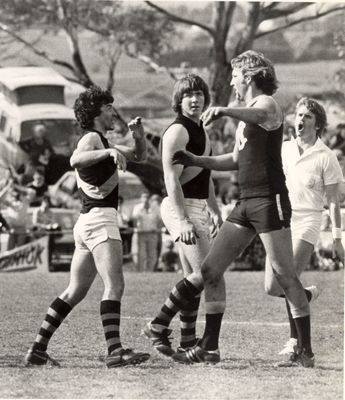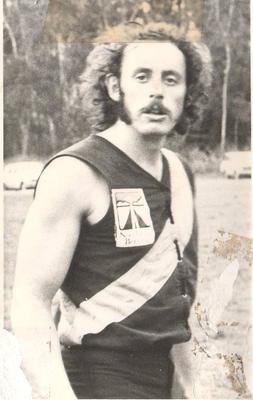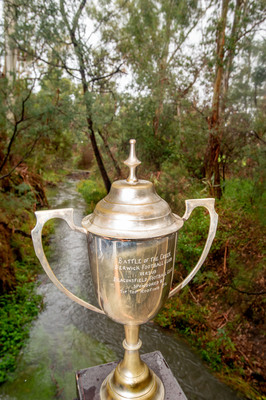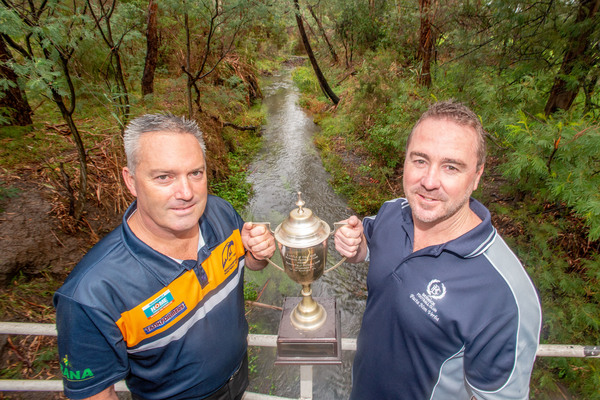
By sports editor Russell Bennett
A three-minute drive is all that separates the Berwick and Beaconsfield football clubs, and even though the Wickers and the Eagles haven’t always charted the same path, their hometowns’ histories have always been intertwined.
In fact, Beaconsfield was even known as ‘Little Berwick’ until 1881, when the Beaconsfield name was officially adopted.
Before the Covid-19 pandemic took hold, the 2020 season was to mark the 130th year since the Beaconsfield Football Club’s first ever game – in a black and yellow Tigers strip, no less – in 1890.
The club’s second game in its inaugural season was played against Berwick, just a week after facing off against Cranbourne.
Beaconsfield club historian, and long-time favourite son, Lawrie Canning recounted the neighbourly rivalry.
He trawled through his archives to find an excerpt from the Beaconsfield correspondent’s match report in the ‘Dandenong Advertiser’, which indicated the level of feeling that existed back in 1890.
Berwick won that game 7.10 (52) to 0.4 (4)… or so Beaconsfield reported.
“The Beaconsfield team played a most determined game throughout, and showed great improvement on their recent match with Cranbourne,” Beaconsfield’s correspondent in the Advertiser explained.
“Of course, as is usual with Berwick, they had what is termed a ‘thirty mile team’, having enlisted players from thirty miles around, or thereabouts, to play for them.
“Another astonishing fact was that four or five of the Beaconsfield men were soon figuring prominently in the Berwick team, which shows very bad taste on their part.
“There is no doubt that if the Beaconsfield team stuck true to their colours, and did not turn traitors, they would take a great lot of beating, but there is very little use in any particular club trying to obtain a victory against a picked team from all parts, as the Berwick one generally is.”
Whack!
Clearly, the Berwick Football Club wasn’t going to take that lying down. And it didn’t.
The following week in the Advertiser, this response from Berwick’s club secretary – Mr W. Paternoster – appeared on the front page:
“Sir – seeing a report in last week’s issue under the heading of ‘Football Notes’, Beaconsfield v Berwick re the results given were false as Berwick kicked 8 goals 6 behinds to Beaconsfield 3 behinds.
“Again the report goes on – Berwick engaged men for thirty miles around – I now beg to enclose list of the players who have played mostly all matches with Berwick: Bain, Boyes, Wauchope (2), Crellan (2), Fuller (2), Milne, Brunt, Stiffy, Trethowan, Paternoster, Harris – 13 in all against 22 of Beaconsfield.
“Can the person who sent in the report prove that any of the above players live 30 miles away, and again the same players have played with Berwick before the Beaconsfield club was ever thought of.
“Again he goes on to say that 4 or 5 Beaconsfield men played for Berwick. Should not any player who first joins Berwick stick to his colours: blue and white? Does the writer of the report know Mr Kerwin and Mr Wilkinson, who played for Beaconsfield, joined Berwick some time back! The former even told me Beaconsfield had no matches on, and he would always play with us. Hoping Mr Editor, you will find room for this explanation in your widely circulated paper.”
Later that season, Beaconsfield had a committee meeting to consider the curious case of John Harrison – a Beaconsfield player who played against the club with Berwick.
The Beaconsfield committee considered it an insult to their club, and even moved to expel Harrison from their ranks!
Of course, the rivalry hasn’t always been as biting as it was in its formative years.
The fact is, people from the same communities, the same schools, and even the same families make up the key pillars of this rivalry.
That’s exactly why it’s meant so much – blood is so much thicker than the waters of the Cardinia Creek, which separates the clubs.
“In the 1970s, if you crossed the (Cardinia) creek to play for Berwick, you weren’t welcome back but those attitudes have softened over the years with a number of players moving between the clubs,” Canning explained.
“This was especially so in the 1980s when Berwick joined the VFA, and in the 1990s when the two clubs were in separate leagues.”
Some 90 years after first going head-to-head, Berwick and Beaconsfield faced each other for the first and only time so far in a grand final – the famous clash of 1980.
Beaconsfield beat Berwick by 50 points in the first game at its new Holm Park Road home in 2013, but the Wickers had defeated the Eagles in the 2012 elimination final and went on to do the same in the 2016 preliminary final.
This year, on 20 June, the Tigers of old were to return home to reminisce – to remember the great times they shared 40 years ago.
Those plans have been put aside for now, and with Berwick looking to a future in the Eastern Football League, fans from both clubs hope the two clubs haven’t already played their last local derby against each other for the time-being.
In the latest edition of ‘Rivalries Revisited’, we look at the historic rivalry that came to be known as ‘The Battle of the Creek’.
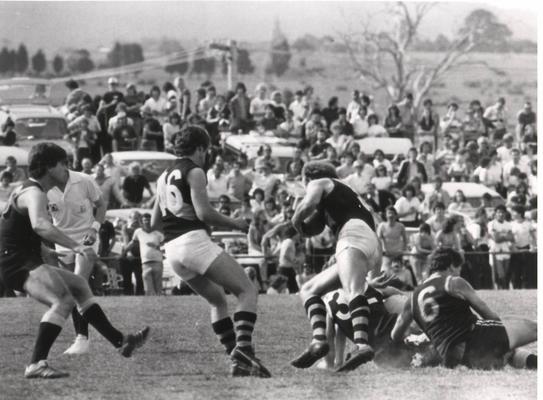
Lawrie Canning – Beaconsfield Football Club premiership player, life member and historian
If there’s something Lawrie Canning doesn’t know about his beloved club, then it really mustn’t be worth knowing.
He joined Beaconsfield in 1969 for one game, fell in love with the place, and joined up for good the following season. He hasn’t left since.
“Beacy hadn’t won a game for nearly two years when I experienced my first win as part of the club,” he said.
“It was against Berwick, at Berwick.
“And the real shame is – thinking about it all now – we don’t know if we’ll end up playing them again.”
But he can’t help but laugh when he describes just how intertwined the two clubs are.
“Just look at the name of the housing estate right opposite our old home ground (Perc Allison Oval) – they called it Berwick Views, right in the middle of Beaconsfield!” he said.
“What an insult! There’s definitely nothing better than beating them… but we haven’t managed it since 2015.
Ironically, Canning is a Berwick resident.
“The problem I have now is that I don’t dislike Berwick the way I used to,” he admitted.
“I have a lot of friends at Berwick – people I’ve known and respected for a long-time.
Canning was a thirds player at Dandenong – a wingman, struggling to get an opportunity – when he played his first game for Beaconsfield, so he played under the name ‘John Bailey’ – a famous former club player and a life member.
Not only has Canning been at Beaconsfield every year since 1970, he met his wife Kerry through the club.
Her father, Jim Parkes, was the first ever Beaconsfield Football Club life member and he was the one who ignited Canning’s passion for the club’s history.
Canning has since made it his mission to research and record all of the club’s players and officials since its inception. He’s already got all the records since 1948 – the season after Officer and Beaconsfield fielded a combined side.
The irony of the Berwick connection at Beaconsfield – and vice-versa – is definitely not lost on him.
“Jimmy Read was an absolute star and was my mentor throughout my career, but even he’s moved to Berwick and when they went to the VFA he even ended up as their chairman of selectors,” Canning said.
“Wayne Goodes was our premiership captain in 1980, with Jimmy our coach, and Wayne ended up on the coaching panel at Berwick under Darryl Nisbet, who coached against us in 1980.”
Clint ‘Boofa’ Evans is the current Berwick coach, and coached Beaconsfield to its most recent senior premiership.
Local legend Bill Gehling is another with a history with both clubs. The former Richmond player was a league best and fairest winner with Berwick before Beaconsfield convinced him to make the switch in its quest for a three-peat in 1982. Beaconsfield ultimately lost in that grand final to a Doveton side coached by Frank ‘Rocky’ Clifford and featuring none other than John Airdrie.

John Airdrie – Beaconsfield Football Club life member, former president
Airdrie and then Berwick president Cliff Donegan were the instrumental club figureheads in officially reigniting ‘The Battle of the Creek’ rivalry in 2002.
The iconic photo of the pair of them holding the cup on the banks of the Cardinia Creek remains etched in the memory of most community footy fans throughout the region.
“When Berwick went into the VFA we always used to say they were a bit uppity on that side of the creek, whereas we were just working class, so we looked at it as the working class versus the white collars,” Airdrie said with trademark honesty.
“The rivalry really became part of footy folklore, I suppose, and it was always spoken about but I spoke with Cliff about reigniting it given we were back in the same competition once again.
“We knew it would help pay the bills and get the crowds along to the games – we’d get 5000 people to a Berwick versus Beaconsfield game.”
Airdrie said that had a huge flow-on effect throughout the two clubs.
“The bar, the canteen – everything would be huge on a day like that,” he said.
“I was just looking for a way, yes to reignite the rivalry, but also at the same time help the clubs financially because we knew those big blockbusters would get the people flooding through the gates.
“The rivalry was always there, but the financial support we got from running those rounds – sometimes as a standalone Sunday fixture – was just massive.”
While the rivalry was on in earnest in the 1970s and ‘80s, its current chapter was born with Airdrie and Donegan on the banks of the creek.
“Then we upped the ante for something special, to play for a cup,” Airdrie added.
“That’s how it evolved into what’s now the classic ‘Battle of the Creek’.
“I always had respect for what Cliff did at Berwick – there was massive mutual respect, really.
“We were both trying to promote our clubs, and footy was the winner overall.”
The two sides don’t just play for the Cup, either. They also play for the Frank Elliot Shield.
He was awarded life membership after many years of administration service to Berwick, and later served for a number of years as a district councilor with the VCFL – representing all the clubs in the area.
He was loyal to Berwick, but famously also had a soft spot for Beaconsfield.
He fought in the Middle East during World War II and even spent time in a German prisoner of war camp.
During Berwick’s seasons in the VFA, he was a driving force behind the efforts to get all of Gippsland supporting the club – even driving to Traralgon every Saturday morning to promote the club on a radio sports program.
After coaching in the late ‘70s elsewhere in the South West Gippsland league, Airdrie was well aware of the existing rivalry back then.
“After I moved to Perth for three years and Sydney for six years for work, I came back and we moved to Berwick,” he recalled.
“I had three boys going to Berwick High, and two of them – Kane and Heath – decided they’d play at Berwick, and Ben said he’d cross the creek and play at Beacy instead!”
But Airdrie’s family heritage is firmly intertwined at Beaconsfield.
“In the 1950s my grandmother was the station mistress at the Beaconsfield railway station and used to wave the trains on with a lantern,” he said.
“My grandfather – who was the trainer at Beaconsfield in the early ‘50s – worked on the railways, and she’d work at the station. My father and my uncle also played in their first ever flag in 1953.”
Then, decades later, while Donegan was the senior president at Berwick, Airdrie served on the club’s junior committee.
“When your children are playing sport – wherever that is – you just put your hand up to help,” Airdrie explained.
“The kids went to school at Berwick, and I always believed they should play with the kids they went to school with – particularly given the high school is right next to the ground.”
The family’s current association with Beaconsfield started in the early 1990s, but its genesis goes right back to the ‘50s.
Jim Read – 1966 St Kilda premiership wingman, three-time Beaconsfield premiership coach
Read isn’t just arguably the most influential figure in Beaconsfield footy history, like fellow triple premiership coach Leigh Clifford (Rocky’s son) he’s also had a profound impact on some of the biggest names who’ve starred in ‘The Battle of the Creek’.
“I went to Beaconsfield to coach in 1972 – I’d moved back after I’d been coaching Hamilton, and I’d worked with a guy who was on the committee at Beaconsfield and I coached there for about six years, gave it away for three, and was asked to go back and coach in 1980 and we were lucky enough to win the premiership,” he explained.
Read recalled how his side so dramatically turned the tables in the grand final, after being comprehensively beaten by the Wickers earlier in the finals series.
“In the second semi Berwick beat us by about 12 goals,” he said.
“Of course, we had to rev the team up a bit and we changed a few things around and the boys knew they hadn’t played well – they were very disappointed – but I said they could still make the grand final, and not only make it but win it.
“Berwick might’ve been a bit over-confident about what happened in the second semi, which I’ve seen happen before, and the boys played their utmost best and we were lucky enough to take the points.”
The turnaround in Beaconsfield’s form in the two finals against Berwick that season was nothing short of incredible.
But Read knew what his men were capable of.
“I’d seen it happen before over the years – in fact it happened to us at Beaconsfield in 1973,” he said.
“We were beaten in the grand final after winning the second semi by about 10 goals, so I’d seen it happen before and I reminded a few of the guys who played then and in 1980 (the likes of skipper Wayne Goodes) – it’d happened before, it could happen again.”
Key to Beaconsfield’s success in 1980 was the return of a number of significant players who’d been playing elsewhere seasons prior.
One such player was Wayne Goodes, the skipper and star player who’d been instrumental to Beaconsfield’s success in the early 1970s before heading to Dandenong.
“He originally came down to Beaconsfield from Merino up in the western district when he was 17 or so, and he played very well from the first time he played,” Read explained.
“He and Johnny Allan went to Dandenong and came back, and when I came back in 1980 they were just enjoying the club again, so they were two pretty good players who had a bit of experience.”
Read was full of praise for the great Graham Watts, who kicked three goals and was the best on ground in the 1980 South West Gippsland grand final.
“On his day, he was just very hard to stop, and he had one of those days,” Read said.
“Lyn Studham played pretty well in the centre too, but it was one of those games where you couldn’t really pick out one better player than another – it was just an even performance by everybody with a couple of blokes standing out.
“Everyone did what they had to do, and that’s why we won.”
Canning, too, recalled just how impressive Watts was in that era – likening him to the great Haydn Robins of more modern times.
Looking back on 1980 being the only senior grand final matchup between Berwick and Beaconsfield so far, Read said that only served to make it even more special.
“When I first coached Beaconsfield they’d call it ‘The Battle of the Bridge’ and they were just two little country towns in those days so there was a bit of a rivalry between the two – they were great opponents.”
But Read was straight to the point about what he thought of Berwick back then.
“Nobody liked Berwick,” he said with a laugh.
“But they were a very good club and they won a couple of premierships under Darryl Nisbet, who was a great coach.
“But I think a lot of the players he had in that grand final were getting a bit older, and we had a lot of younger blokes who were pretty fit and really wanted to win a grand final.
“After the second semi they had a point to prove – every one of them did.”
Read said that could have been the wake-up call that some of the Beaconsfield players were looking for.
“They were very united blokes and they were just so disappointed that they wanted to do something about it.”
For Read, his side’s turnaround in pressure in those two 1980 finals made all the difference.
“I always tried to teach them that when the other mob had the ball, you’d try to get it back straight away and the only way you could do that was by putting pressure on the opposition.
“It’s a pretty simple game.”
Read looks back fondly on the first of his three flags at Beaconsfield – as captain-coach in 1974 – but the era in the early 1980s clearly carries its own significance.
“When I came back 1980 we won it, and we won it again in ’81 and made the grand final in ’82, so that was a thrill,” he said.
“It would have been nice to win three-in-a-row, but they don’t come around that easily and I was still very pleased with the boys’ efforts in ’82 (ultimately losing to Rocky Clifford’s Doveton side).”
And these days? Read, like Canning, is a Berwick resident.
“I still run into blokes like Tommy Watson and Dicky Tonks from Berwick around the traps, and we always got on well together off the field,” he said.
“But on the field was a bit different.”
Still, the respect was always there.
“When Darryl Nisbet coached Berwick and I was coaching Beaconsfield, he knew what he was doing – he’d been around the traps and knew if you went out and smacked blokes that wasn’t going to help you win, anyway,” Read said.
“Darryl and I have known each other for years – his father was chairman of selectors when I was at St Kilda.”
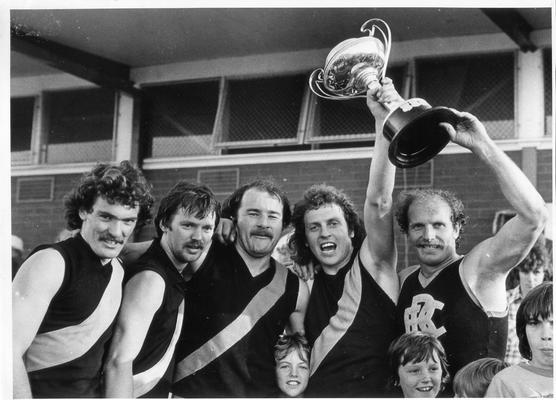
Wayne Goodes – Former Beaconsfield premiership skipper, three-time former premiership star
The premiership skipper, Goodes could proudly talk about that 1980 season for hours. He was one of a key group of players who returned that year, and they were rewarded with the ultimate prize.
“Heading into the finals, everything was all about Berwick – they had all the hype as the team to beat,” he said.
“But deep down we were very confident.
“Jimmy, our coach, is very conservative in some ways but I’ll never forget his address during the week before the game – he said he expected us to win it comfortably.”
Goodes said that’d be enough to shock anybody leading into a grand final.
“But that was just his take on it because we had the closeness as a group, and the ability to win – and he was proven right.
“We were really close, and it held us in good stead on the day.”
When Goodes heard, straight from Read’s mouth, just how bullish he was leading into the game, he didn’t say much.
“I’d back him up on everything he said,” Goodes explained.
“I don’t think many people have even discussed this since.
“Jimmy was confident, and I think it just instilled something in us that we felt we really could do it.
“1980 was our year, and of the three flags I played in there, it was clearly the best – because it was Berwick, I think, and where we’d come from as a group prior to that.”
Over the journey, Berwick had the knack of knocking off Beaconsfield at Beaconsfield, and Beaconsfield would often do the same away to Berwick.
It just typified the extra few per cent the sides would rise in their match-ups.
“I’ve had a great relationship with them all the way along, but you’d always want to beat those blokes up the hill,” Goodes said.
And he’s another one with his own Berwick connection. He joined the club when his son Jarrod was playing juniors there, and he even coached some of the up-and-coming talent.
He also served on the senior match committee alongside Nisbet and was chairman of selectors for a brief period in the mid-1990s.
“Darryl and I always got along – even as soon as the games between Beaconsfield and Berwick finished,” Goodes said.
“We just had this respect for each other, and still have to this day.
“We always have some great banter whenever we catch up – he’s a ripper bloke, like so many of them are. I’ve met some great people out of Berwick and I’m mates with a lot of them today.”
Truth be told, Goodes’ respect for Nisbet only continued to rise as he worked alongside him for that period at the Wickers.
“He was an old-fashioned coach and wasn’t afraid to tell the players where they went wrong,” Goodes explained.
“I think we complimented each other pretty well, tactically.”
Looking back on the 1980 grand final, specifically, Goodes remembers the efforts of Darryl ‘Shags’ Sheehan, who kicked five goals in an unexpected star turn.
“He would have been about 60 kilos ringing wet,” Goodes explained.
“I even had someone from an opposition club say he’d get badly hurt in the grand final, going up against the bigger bodies. He definitely looked younger than he was.”
That’s what made his performance so memorable that day.
But Sheehan flew to Western Australia soon after the game, and it was another 20 years before Goodes and the rest of their premiership team mates could celebrate the win with him.
“Both sides in 1980 had some of their greatest ever players in those teams – we had at least six or seven players from our Team of the Half Century in there,” Goodes added.
“I’m always thinking about that game – when I’m on the mower, when I’m doing all sorts of things, particularly given the reunion was supposed to be this year.”
But, if the reunion did go ahead this year, Goodes said it wouldn’t necessarily be dominated by footy talk.
“The conversation quickly turns to the social side, mate,” he said.
“That time of my life was the best time in terms of enjoying people’s company and just having an absolute ball in club life.
“We were a fit group, but by god we drank some beer – put it that way!”
Goodes and Brian Southorn were the only two players who played in all three premierships – 1974, 1980, and 1981 – with Read also involved as coach.
“And we’re very close because of it,” Goodes explained.
“Coming to Beaconsfield at such a young age, I got one of the best coaches going around.
“That time was just invaluable for me, and Ready and I are closer than we’ve ever been, now.
Todd Devine – multiple senior best and fairest winner at Berwick, former captain, and current sponsor
Devine’s name is one of the first that springs to mind when thinking about star former Berwick players.
While the club didn’t enjoy the ultimate success at senior level during his playing career, he’s been instrumental on the coaching panel of multiple senior premiership-winning sides since.
He said games against Beaconsfield would always be earmarked on the fixture.
“Even if you were carrying a niggling injury, you’d always make sure you got up for those games,” he said.
“They were always fierce, and you’d feel a huge amount of pride if you were able to win and hold up that plaque.
“I just remember how passionate the feeling was in those games – you’d look forward to them, weeks out.
“Even when both sides were down the ladder a little bit, those games would always be closely-fought.”
Devine looks back fondly on his early ‘90s battles with former Beaconsfield opponent Paul Beck, who’s now a great mate of his.
But there was one clash against Berwick that put footy into some real perspective when Beaconsfield player Scott Poulton, a crane operator by trade, suffered a serious compound fracture of his leg in a game at Edwin Flack Reserve and was left out of work for months.
Players from both sides came together to take part in the fundraising efforts for him.
Russell Trait – Berwick Football Club life member, former player
Trait, a great mate of Devine’s, remembers the incident vividly – and the mateship with dyed in the wool Beaconsfield people that followed.
“The rivalry (against Beaconsfield) was something we inherited from the older crew at the club – Tommy (Watson), Cliffy (Donegan), and Jim Hower who was like the Ted Whitten Sr of the footy club,” Trait explained.
“We inherited it, but we’ve had some great battles over the years – and formed some great friendships.”
Trait even started ski racing with the likes of Paul Beck and Scott Poulton and went away on trips together.
On the field, they once thought of the battle as a kind of war without guns, but they soon worked out a vastly different reality off the ground.
And the lasting legacy has been the mateships.
“Good footy clubs are all very similar – they just have different coloured jumpers,” Trait explained.
“It can just take a while to get that through to the younger blokes.
“I love going to Beacy. The ground is just a ground – it’s the people who really make it.”
Tom Watson – Berwick icon, and one of only three ‘double’ life members
Watson lives and breathes the Berwick footy club, much like his good mate Canning at Beaconsfield.
Along with the great Jim Hower (1978 and 2007) and Donegan (1975 and 2006), Watson is one of only three to have received the incredibly prestigious ‘double life member’ honour at the Wickers.
He played most of his footy west of Melbourne and came to Berwick in 1972 – playing that season as assistant coach.
After heading away working on gas and fuel conversions for 12 months, he came back and served as assistant coach for another three years at the Wickers.
“Dicky Tonks and I became very good mates, and still are to this day – he coached Berwick for those three years,” Watson explained.
“Both of us finished up on the conversions up at Albury-Wodonga and Shepparton, and when we came back from there we coached ROC for two years.”
Then, after returning to the Wickers once more, Watson has remained on the club’s committee ever since and has been doing the timekeeper’s role for the past 12 years since Hower’s passing.
He has his own take on the significance of the Berwick and Beaconsfield rivalry.
“We always love to beat Beaconsfield, but as far as I’m concerned they’re a fantastic lot of people – particularly Goodesy. His son married my daughter!
“Jimmy Read is another great bloke – he was an assistant at Berwick for a couple of seasons in our VFA years.
“We ran into Jimmy at Peter Allen’s funeral, and Tonksy and I spoke with him about going up to his place and having a yarn.
“We loved to beat him when we went up against him, but we always loved having a chat after the game.”
And it’d come as little surprise that Watson and Canning still get along like a proverbial house on fire.
“To this day, whenever we run into each other on game days we probably spend the next 20 minutes yapping away,” he said.
“The only thing wrong with him is that he’s involved with the wrong bloody club! He should be at Berwick.
“His knowledge of the Beaconsfield footy club – and the local footy world, more broadly – is just incredible. He’s a remarkable man.”
But Watson’s involvement as a club historian shouldn’t be undersold, either.
For well over a decade now he’s been involved in compiling the Wickers’ history – particularly given the new names and faces that have joined the ranks in modern times.
“You talk about blokes like Billy Williamson – up at the old Arch Brown ground, which was our home for many years, the change room’s named the W. Williamson Room.
“A lot of people wouldn’t know who Billy or Archie were, so I write about them. I knew them, and they were all great blokes at our club.
“The names go on – blokes like Barry Johnson, who owned the Berwick pub and poured so much money into the footy club over the years. You could just so easily go on and on about these people because they were all part of the fabric of our community, and I know Beaconsfield’s history is filled with the same kinds of figures.
“Of course there’s only that creek between the two clubs, really, so there’s always a massive rivalry between each other whenever we face off.
“We’ll always love to beat them, but off the field there’s nothing but respect from my perspective.
“If we go into the Eastern Football League, I reckon 90 per cent of us would be barracking for Beaconsfield in the other league – I definitely would, anyway. I’d be barracking for them to beat the Narre Warrens and Dovetons.
“Whether you’re a Berwick, Beaconsfield, Narre Warren, or Doveton person – you’re only there because you love your club, and you love the people.”

